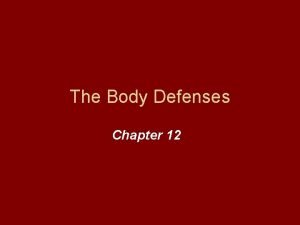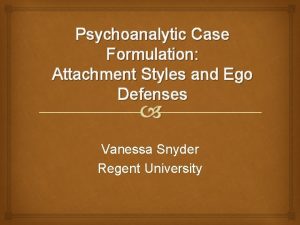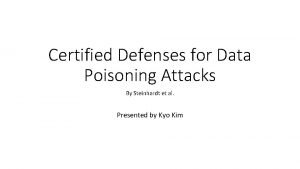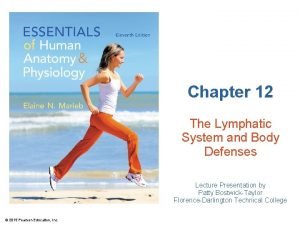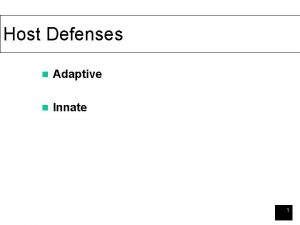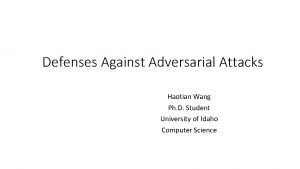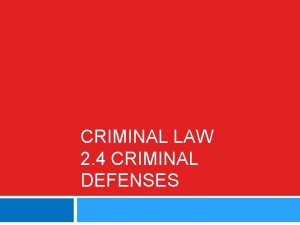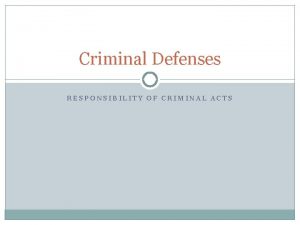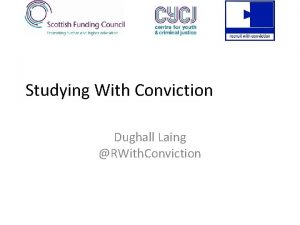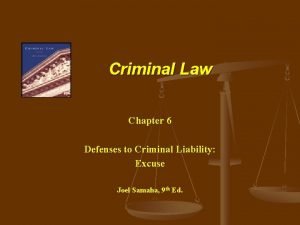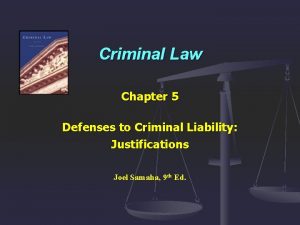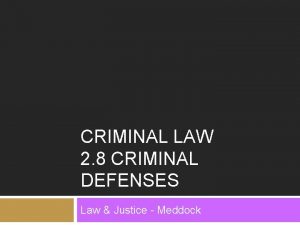Criminal Defenses Defenses For a conviction to occur












- Slides: 12

Criminal Defenses

Defenses �For a conviction to occur in a criminal case, the prosecutor must establish beyond a reasonable doubt that the defendant committed the act in question with the required intent.

No Crime Has Been Committed �The defendant may present evidence to show that: 1. no criminal act was committed 2. no criminal intent was involved

Defendant Did Not Commit the Crime �Alibi- evidence that the defendant was somewhere else at the time the crime was committed �DNA evidence- to connect an offender conclusively to the crime �Even if an offender does not leave fingerprints at a crime scene, he or she might leave biological evidence – a single hair, for example – at the scene without knowing it. �Although the state can use DNA evidence to prove that the defendant was at the scene or committed the crime, a defendant can also use DNA evidence to prove that he or she did not commit the crime.

Defendant Committed the Act, but it Was Excusable or Justifiable �Sometimes an otherwise criminal act may be considered excusable or justifiable. �Defenses in this category include self-defense, defense of property, and defense of others. �The law recognizes the right of a person who is unlawfully attacked to use reasonable amount of force in self-defense. �A person cannot use more force than appears to be necessary. �If, after stopping an attacker, the defender continues to use force, the roles reverse, and the defender can no longer claim self-defense.

Defendant Committed the Act, but it Was Excusable or Justifiable (cont. ) �Deadly force can usually be used only by a person who reasonably believes that there is imminent danger of death or serious bodily harm. �A person is allowed to use deadly or non-deadly force to defend a third person if the person defended can claim self-defense. �Reasonable non-deadly force may be used to protect property. �Some states have enacted Stand Your Ground laws, also known as the Castle Doctrine, which gives persons the right to use deadly force to defend their property against unwarranted intrusion.

Defendant Committed the Act but Is Not Criminally Responsible �Some defenses in a criminal case rest on the defendant’s lack of criminal responsibility. �Although it is acknowledged that he or she committed the criminal act, he or she may be considered not criminally responsible. �In this category the defenses of infancy, intoxication, insanity, entrapment, duress, and necessity.

Infancy �Infancy- the legal defense of a person considered not yet legally responsible for his or her actions �In Florida, a 12 -year-old boy was tried as an adult for the death of a 6 -year-old girl that resulted from the boy using a wrestling move on her that he saw on TV. He received a mandatory life sentence under a “tough on crime” law that was passed in the mid 1900 s.

Intoxication �Intoxication- the defendant claims that at the time of the crime, they were so drunk on alcohol or high on drugs that they did not know what they were doing.

Insanity �Insanity Defense- defense raised by a criminal defendant stating that because of mental disease or defect, the defendant should not be held responsible for the crime committed �After killing her five children, Texas mother Andrea Yates was not found guilty by reason of insanity in 2006.

Entrapment �Entrapment- the defendant admits to committing a criminal act but claims that he or she was induced, or persuaded, by a law enforcement officer to commit the crime.

Duress �Duress- a person that does something as a result of coercion or a threat of immediate danger to life or personal safety. �Suppose someone points a gun at your head and demands that you steal
 Conviction over convenience
Conviction over convenience Praying for conviction
Praying for conviction Conviction vs confidence
Conviction vs confidence Destiny lsf
Destiny lsf Conviction in the outsiders
Conviction in the outsiders On adaptive attacks to adversarial example defenses
On adaptive attacks to adversarial example defenses Chapter 12 the lymphatic system and body defenses
Chapter 12 the lymphatic system and body defenses Ego defenses
Ego defenses Certified defenses for data poisoning attacks
Certified defenses for data poisoning attacks Chapter 12 the lymphatic system and body defenses
Chapter 12 the lymphatic system and body defenses Quizlet
Quizlet Host defenses
Host defenses Nicolas papernot
Nicolas papernot






